UW-Superior is the only university in the region to receive this classification

The University of Wisconsin-Superior has been named a recipient of the Carnegie Community Engagement Classification.
The University of Wisconsin-Superior has been named a recipient of the Carnegie Community Engagement Classification, an elective designation that indicates institutional commitment to community engagement. This is the first time UW-Superior has received this recognition and it is the only university in the region to receive this classification.
“Receiving this prestigious distinction is a point of pride for UW-Superior, our partners, and the broader region,” said Jenice Meyer, director of the Center for Community Engaged Learning. “This recognizes that UW-Superior does an exceptional job enriching student learning with hands-on, community-based experiences that also benefit small businesses, non-profits, schools, government, and the broader community.”
This important classification is awarded following a process of self-study by each institution, which is then assessed by a national review committee led by the Swearer Center for Public Engagement at Brown University, the administrative and research home for the Carnegie Community Engagement Classification.
“These newly classified and re-classified institutions are doing exceptional work to forward their public purpose in and through community engagement that enriches teaching and research while also benefiting the broader community,” said Mathew Johnson, executive director of the Swearer Center.
Of the 119 institutions classified in the 2020 cycle, 44 are receiving the classification for the first time while 75 are now re-classified, after being classified originally in 2010 or 2015. These 119 institutions join the 240 institutions that earned the classification during the 2015 selection process, for a total of 359 campuses who are currently active holders of this important designation. Among the 2020 recipients of the classification, 67 are public institutions and 52 are private.
“This award demonstrates our current, and continued commitment to partnerships and our region,” said Meyer. “Together, through partnerships, we can achieve so much for our students, our university, and the broader community and region.”
The Carnegie Community Engagement Classification has been the leading framework for institutional assessment and recognition of community engagement in U.S. higher education for the past 14 years with multiple classification cycles in 2006, 2008, 2010, 2015 and 2020.
“We also note that many more institutions who are not receiving classification today are doing similar important work and we celebrate them as well,” said Johnson. “Many campuses are facing difficult times and finding it challenging to maintain and advance their community engagement in the current climate. It is our hope that by celebrating these classified campuses others might come to see community engagement as part of the strategy to address the current set of challenges in higher education.”
| The Carnegie Foundation for the Advancement of Teaching aims to build a field around the use of improvement science and networked improvement communities to solve long standing inequities in educational outcomes. The Foundation, through the work of the Carnegie Commission on Higher Education, developed the first typology of American colleges and universities in 1970 as a research tool to describe and represent the diversity of U.S. higher education. The Carnegie Classification of Institutions of Higher Education (now housed at Indiana University Bloomington’s Center for Postsecondary Research) continues to be used for a wide range of purposes by academic researchers, institutional personnel, policymakers and others. |
